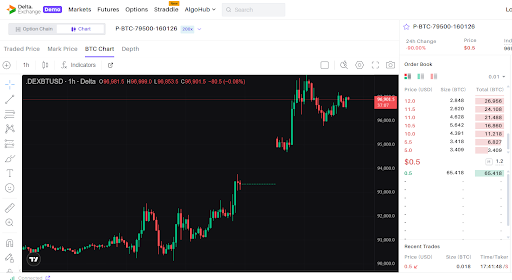Blockchain
Why is Bitcoin Price Falling Down?

Bitcoin price as recently experienced a significant downturn, briefly slumping below $63,000 after reaching a record high of $73,000 just last week.
This sharp decline marks a pivotal moment in the cryptocurrency’s performance, shedding more than $10,000 from its all-time high and signaling a potential shift in market dynamics.
Several factors contributed to the quick rise to $73,679, including the successful introduction of spot bitcoin exchange-traded funds (ETFs) in the U.S. and a surge in investor interest. However, the subsequent correction has raised questions about the sustainability of its rally and the underlying factors contributing to its volatility.
Several causes contributed to the downturn, including traders taking profits following Bitcoin’s significant 70% increase from the beginning of the year to its high.
This profit-taking has led to a spike in long liquidations of leveraged Bitcoin positions, with significant liquidations occurring across centralized exchanges.
The introduction of spot bitcoin ETFs, while initially contributing to the rally, has also played a role in the increased leverage and high-frequency volatility observed in the market.
As investors and analysts warn of more volatile price action in March, the recent pullback from Bitcoin’s long-term uptrend has become a focal point for market participants.
Moreover, the broader cryptocurrency market has felt the ripple effects of Bitcoin’s decline, with other major cryptocurrencies such as Ether and Solana experiencing notable losses.
The interconnectedness of the cryptocurrency market means that movements in Bitcoin often have a significant impact on altcoins and related stocks.
Understanding the elements driving Bitcoin’s price, such as supply and demand dynamics, regulatory changes, and investor attitude, becomes increasingly important when the market experiences volatility.
The recent downturn serves as a reminder of the inherent volatility and risks associated with investing in cryptocurrencies, prompting investors to exercise caution and closely monitor market trends.
Analyzing Bitcoin Recent Price Drop: Economic Pressures and Market Dynamics
Bitcoin’s value has experienced a notable decline, dropping to $63,500, marking its lowest point in the past two weeks. This 6% decrease on Tuesday is attributed to a combination of factors, including recent U.S. inflation data and significant outflows from the Grayscale ETF, which have contributed to a broader market correction.
Market Liquidations and ETF Outflows
The futures market has seen substantial liquidations, totaling $655.44 million, with Bitcoin and Ethereum positions being the most affected. According to Coinglass, “In the last 24 hours, 240,997 traders have been liquidated, with total liquidations amounting to $655.44 million. The largest single settlement order occurred on OKX – BTC-USDT-SWAP for $12.25 million.”

Grayscale ETF has faced one of its largest daily outflows in history, with 9,539 BTC withdrawn. Despite BlackRock’s acquisition of 6,703 bitcoins, the overall balance for the day was negative by 2,293 bitcoins. This outflow has not only increased selling pressure but also potentially alarmed other market participants. BitMex reported, “Bitcoin ETF outflow – March 18, 2024. GBTC outflow at $643 million,” highlighting the significant impact of these movements on the market.

Economic Factors Influencing Bitcoin Price
The U.S. economy’s struggle to achieve its 2% annual inflation target has raised concerns among investors. With expectations of an interest rate cut by the Federal Reserve not materializing, fears are growing that rates will remain between 5.25 and 5.5% for an extended period. This economic pressure has not only affected Bitcoin but also other assets like gold, which has seen a 2% decline over the week.
Investors are anxiously awaiting the next Fed meeting, scheduled for Wednesday, anticipating potential negative remarks from Jerome Powell and his team. Bitcoin’s significant drop, attributed to its well-known volatility, underscores the market’s sensitivity to economic indicators and central bank policies.
Scott Melker, expressing his concerns, stated, “Fundamentally, with ETF interest and the cycle increasing, I want to believe that we will go much, much higher. However, most of the key signs I would normally look for when not in FOMO are present,” highlighting the market’s current state of uncertainty.
Broader Cryptocurrency Market Impact
Following Bitcoin’s downturn, other cryptocurrencies have also suffered losses. Ethereum, despite its recent Dencun update, has lost around $800 over the week, trading at $3,200. Meme coins such as Dogwifhat (WIF) and Bonk (BONK) have experienced significant declines, alongside more established projects like Jupiter (JUP), Worldcoin (WLD), and Solana (SOL).

As the market navigates through these turbulent times, investors are closely monitoring Bitcoin’s support levels, the outcomes of the upcoming Fed meeting, and ETF flows. Despite the short-term challenges, the long-term uptrend remains a protective factor for those invested in the cryptocurrency space.
Blockchain
5 Reasons Why Delta Exchange is the Easiest Platform for Crypto Trading Strategies in the Indian Market

Crypto trading in India has grown exponentially in the last few years. In 2025, the market pulled in $258 million in revenue and is on track to hit nearly $732 million by 2033, growing at a 14.3% CAGR from 2026 onwards. That kind of money doesn’t come from people buying Bitcoin on a whim and hoping for a lucky spike. It comes from traders who plan entries, manage exits, build hedges, and run full-blown crypto trading setups.
This shift has created a new problem. Most Indian crypto exchange apps still feel built for basic spot buying without any advanced features to try. You open five tabs, check prices on one app, place orders on another, track risk on a third, and hope nothing slips through.
Delta Exchange transforms the story here. Instead of spots, Delta offers a safe trading platform to explore crypto derivatives (futures and options) across major currencies.
Let’s understand more about Delta Exchange and why so many Indian traders end up sticking with it once they try it.
Why Try Crypto Trading Strategies on Delta Exchange
Ranked among the top Indian crypto exchanges, Delta Exchange offers a range of features and analytics tools to simplify your crypto trading experience.
Here’s why many traders trust Delta Exchange:
- INR trading keeps things simple
If you’ve ever had to convert INR to USDT or USD just to trade Bitcoin, you know the hassle. Delta Exchange lets you deposit and withdraw in INR directly via UPI, IMPS, NEFT, and bank transfer, with your margin and profits shown in INR.
That means no awkward crypto conversions or extra wallets – you fund your account straight from your bank and start crypto trading like it’s normal money.
- Algo trading bots that actually work
Automation can save hours and reduce emotional stress and decisions, especially with fast moves in crypto F&O. Delta Exchange supports algo trading through APIs and bot integrations from platforms like TradingView and Tradetron.

You can link your trading strategy to webhooks or APIs and let bots place trades for Bitcoin futures or other crypto options even when you’re away. If you want systematic, repeatable strategies with fewer missed opportunities, this setup feels practical and real.
And the best part? You don’t need to have any coding knowledge or degree – API Copilot does it all for you.
- Lower trading fees that don’t eat into your wins
Fees matter because every percentage point you pay is one less in your pocket after a winning trade. Delta Exchange offers competitive taker and maker fees, plus a fee cap on options that limits how much you pay on low premium trades.
This helps keep costs predictable, whether you’re trading Bitcoin or ETH futures and options. Traders who place frequent trades or use multi-leg strategies on the Indian crypto exchange can keep more of their gains, rather than having them eaten up by trading fees.
- Strategy Builder for practical trading plans
Strategy planning can get messy if the platform doesn’t help you visualize outcomes. Delta Exchange offers tools that let you craft crypto F&O setups with clear strike choices and expiries, plus daily, weekly, and monthly options for more precise timing. This helps you conveniently plan spreads, straddles, or hedges.
- Compliance and risk measures to know
It’s one thing to trade, another to trust the platform doing it. Delta Exchange is registered with India’s Financial Intelligence Unit (FIU) and follows local KYC and AML rules.
For risk management, the platform supports:
- Margin controls and stop-loss tools that help you manage positions while you trade Bitcoin or other crypto derivatives.
- Demo account to practice trades and understand the market without real money.

- Payoff charts show you how your trade will play out with breakeven points and maximum P&L.
This way, you can study your crypto trading strategy better before finalizing the trade.
Apart from these, Delta also offers leverage up to 200X – a good way to amplify your profits if the market moves in your favor.
The Bottomline
Indian crypto traders have moved far past the buy-and-hold phase. Spot crypto trading still has its place, yet most active users now want faster ways to make money from price swings, not wait months for a rally.
That’s where crypto F&O, spreads, and short-term setups step in. You want tools that let you react within minutes, control risk, and lock gains when the move shows up.
Platforms that only support basic coin buying just can’t keep up with that style of trading. Serious traders want flexibility, speed, and ways to work with volatility, not sit through it – and Delta Exchange caters to such traders well.
Disclaimer: Crypto trading carries inherent risks due to its high volatility. This article is for informational purposes only. Kindly do your own research before making any investment decisions.
Blockchain
MoonExe Aligns With the Next Phase of Stablecoin Payments as Global Regulation Accelerates

MoonExe today reaffirmed its strategic focus on stablecoin-powered payment infrastructure as global regulatory clarity continues to accelerate across major financial jurisdictions.
Regulators worldwide are advancing frameworks that formally recognize stablecoins as legitimate instruments for payment, settlement, and treasury operations. Legislative initiatives in the United States, expanded licensing regimes in Asia, and structured compliance approaches in other regions are collectively signaling a transition from experimental adoption to regulated, real-world deployment.
As stablecoins move deeper into mainstream financial infrastructure, demand is increasing for platforms capable of delivering real-time liquidity, transparent pricing, and verifiable settlement. MoonExe’s Exchange Finance (ExFi) model is designed to address these needs by enabling stablecoin-based currency conversions that operate continuously, without dependence on traditional banking cut-off times or geographic limitations.
The platform focuses on facilitating efficient value movement while maintaining transparency through public blockchain records. Transactions executed within the MoonExe ecosystem can be independently verified via standard blockchain explorers, reinforcing confidence through auditable, immutable data.
In parallel with regulatory progress, market participants are increasingly prioritizing infrastructure reliability over speculative activity. Stablecoins are being evaluated less as alternative assets and more as operational tools capable of supporting cross-border payments, digital commerce, and treasury flows.
MoonExe continues to expand its infrastructure and partnerships to support this evolution, positioning itself as part of the foundational layer required for stablecoins to function at global scale.
For more information about MoonExe and its stablecoin payment infrastructure, visit https://moonexe.com/
Blockchain
Playmaker to Launch in Q2 2026 as Midas Labs Expands Its AI-Powered Game Creation Ecosystem

Midas Labs, a UK-based Web3 technology company, has announced the upcoming launch of Playmaker, an AI-powered game creation and launchpad platform scheduled for Q2 2026. The platform is designed to lower barriers to game development and funding, operating as a core product within the UNIFI-powered Midas ecosystem.
Playmaker will provide creators, indie studios, and early-stage visionaries with an integrated environment to ideate, build, fund, and publish games without the traditional constraints of large teams or complex technical infrastructure. By combining AI-assisted creation tools with a structured launchpad and marketplace, the platform aims to streamline the path from concept to live product.
According to Jonathan Wheatley, Chief Marketing Officer of Midas Labs, Playmaker represents a natural progression of the company’s ecosystem strategy.
“Playmaker is about enabling participation at every level — from creators and developers to early supporters and players,” said Wheatley. “By integrating AI-driven creation with funding and publishing infrastructure, we’re building a system that allows ideas to move efficiently from concept to execution.”
The platform is powered by the $PLAY token, a fixed-supply utility asset used for project participation, creator payments, marketplace transactions, and ecosystem services. $PLAY operates within the broader UNIFI ecosystem, where UNIFI serves as the access and conversion layer, reinforcing liquidity and alignment across Midas Labs’ products.
Midas Labs has structured Playmaker’s token economy around a non-mintable, scarcity-driven model, designed to support long-term sustainability as platform adoption increases.
The Playmaker launch builds on recent Midas Labs milestones, including the expansion of the Midas Play Marketplace, multiple game releases, ecosystem partnerships, and the rollout of UNIFI staking infrastructure. Together, these components form a vertically integrated environment linking creation, funding, distribution, and participation.
Playmaker is scheduled to go live in Q2 2026, with phased ecosystem access beginning with early contributors before expanding globally.
About Midas Labs
Midas Labs is a United Kingdom–based Web3 technology company focused on building scalable digital ecosystems across gaming, AI, and creator-driven platforms. Powered by the UNIFI token, Midas Labs develops infrastructure designed for long-term participation, real utility, and sustainable growth.
-

 Crypto4 years ago
Crypto4 years agoCardalonia Aiming To Become The Biggest Metaverse Project On Cardano
-

 Press Release5 years ago
Press Release5 years agoP2P2C BREAKTHROUGH CREATES A CONNECTION BETWEEN ETM TOKEN AND THE SUPER PROFITABLE MARKET
-

 Blockchain5 years ago
Blockchain5 years agoWOM Protocol partners with CoinPayments, the world’s largest cryptocurrency payments processor
-

 Press Release5 years ago
Press Release5 years agoETHERSMART DEVELOPER’S VISION MADE FINTECH COMPANY BECOME DUBAI’S TOP DIGITAL BANK
-

 Press Release5 years ago
Press Release5 years agoProject Quantum – Decentralised AAA Gaming
-

 Blockchain5 years ago
Blockchain5 years agoWOM Protocol Recommended by Premier Crypto Analyst as only full featured project for August
-

 Press Release5 years ago
Press Release5 years agoETHERSMART DEVELOPER’S VISION MADE FINTECH COMPANY BECOME DUBAI’S TOP DIGITAL BANK
-

 Blockchain6 years ago
Blockchain6 years ago1.5 Times More Bitcoin is purchased by Grayscale Than Daily Mined Coins






